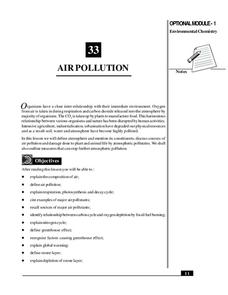Curated OER
High-Tech Food: Science in Your Shopping Cart
Kids are given a lot to think about, as they delve into the world of high-tech foods. They discuss GMOs, biotechnology, food enhancements and domestication. They view videos, engage in class discussions, complete worksheets, and learn...
Curated OER
By the Pound
Agriculture surrounds us every day; incorporate measuring tools into a study of Oklahoma's agricultural industry! Small groups read an informational text (included) before visiting stations where they investigate prices of various...
Curated OER
Will You Pick My Cotton?
Use this cross-curricular history lesson to work on your students' informational writing skills. After listening to songs and stories related to Sultana, they engage in a several activities to boost their understanding of slavery and...
Curated OER
Colonial North America
Showcase the religion, conflicts, daily life, and politics of Colonial North America. A very well-done presentation highlights all the major colonial groups, social norms, demographics, and political struggles of the time. Perfect for an...
Curated OER
Soils
Students apply knowledge of soil, environmental impacts, economics, multiple human demands, and use given data for a proposed scenario in making land use decisions. They debate land use issues and/or scenarios and discuss a case study.
Cold Spring Harbor Laboratory
Children Resemble Their Parents
Gregor Mendel's work revolutionized agriculture from an art to a science. Explore Mendel's work with an interactive lesson that includes animations, video, and practice problems. The instruction describes the early discoveries that...
Stanford University
Edward Curtis Photographs
A picture is worth a thousand words. The photos of Edward Curtis capture the life and culture of Native American Tribes during the early part of the twentieth century. A presentation first gives background information on Edward Curtis...
Curated OER
THE GAM SAAN ADVENTURE ARE YOU WILLING TO RISK IT?
Fourth graders study the lasting influence of the Pony Express, Overland Mail Service, Western Union, and the building of the transcontinental railroad, including the contributions of Chinese workers to its construction. They explore the...
Curated OER
Counting on Cooperatives
Young scholars are introduced to the study of economics, including an introduction to basic business types and systems. They investigate about international, national and California history as they take a historical tour of cooperatives...
Curated OER
Shadows of North Carolina's Past
Students construct a timeline of four major culture periods in Native American history from studying archaeological evidence cards.
Curated OER
Folktale through African Art
Young scholars study folktales and other stories from West Africa. By hearing and reading these stories they explore many new cultural and religious beliefs, such as spirits inhabiting nature and possessing special powers. Once the...
Curated OER
Understanding Mayan Culture
Students study an ancient culture in Mexico whose people were called the Mayans. They compare certain aspects of Mayan culture with Ancient Egypt. They discuss why some other ancient cultures (Egypt and China) were able to survive for...
Curated OER
Early Industrialization
Eighth graders analyze primary source documents emphasizing young people in factory labor (mill workers during 1840-1860). They study hours of labor, ages of laborers, reasons for working, and working conditions. They write a poem or song.
Curated OER
Maps and Models
Students study maps of New Mexico examining settlement patterns over time and the location of water sources. They research the history of their community and discover how cultural groups interacted, adapted to their physical...
National Institute of Open Schooling
Water Pollution
Fifteen million children under the age of five die each year due to diseases in their drinking water. Water pollution is the topic of lesson 34 in the series of 36. Scholars, through reading and discussing, study numerous aspects of...
Curated OER
Water Supply and Water Uses
A large variety of topics are given in this PowerPoint about water. Some come from a scientific point of view, some regarding recreation, some for domestic use, and others from hydroelectricity. A teacher could choose to use this...
Library of Congress
Industrial Revolution
Could you live without your phone? What about cars, steel, or clothing? Class groups collaborate to produce presentations that argue that either the telephone, the gramophone, the automobile, the textile industry, or the steel industry...
Teach Engineering
Extinction Prevention via Engineering
It's time to save endangered species through engineering. The third instructional activity in a nine-part Life Science unit has young environmentalists study species extinction. An engaging discussion leads to some ideas on how to use...
National Endowment for the Humanities
The Mexican Revolution
The legacies of the Mexican Revolution are visible today—even if some history classes don't cover them. Using primary sources from leaders in Mexico at the time of the popular uprising and other evidence, such as railroad maps, young...
National Institute of Open Schooling
Air Pollution
Seventy percent of the air pollution in China is due to car exhaust. Under the umbrella of environmental chemistry, learners extensively explore air pollution. From the makeup of our atmosphere to sources of major air pollutants, classes...
Council for Economic Education
Great Civilizations Develop around Rivers
If you lived in prehistoric times, what kinds of choices could your family make to increase their chance of survival? By making similar decisions in a simulation game, participants discover how specialization creates both opportunity and...
Council for Economic Education
Entrepreneurs in Mesopotamia
While ancient Mesopotamia didn't have the TV show "Shark Tank," it was a time of entrepreneurship as workers began to specialize. Both individual workers and the societal structure encouraged individuals to consider how they could...
College Board
2007 AP® Human Geography Free-Response Questions
Indigenous languages are making a comeback in some parts of the world. People now see land use patterns in our cities' marketplaces. Why do these things happen? Queries from the 2007 AP exam in Human Geography unpack these complicated...
Curated OER
SCHOOLYARD SUNDIAL
Learners study the apparent motion of the Sun in the sky over the course of a day and a year, and analyze what causes seasons on Earth. They participate in a project that has both a science as well as an art component.

























